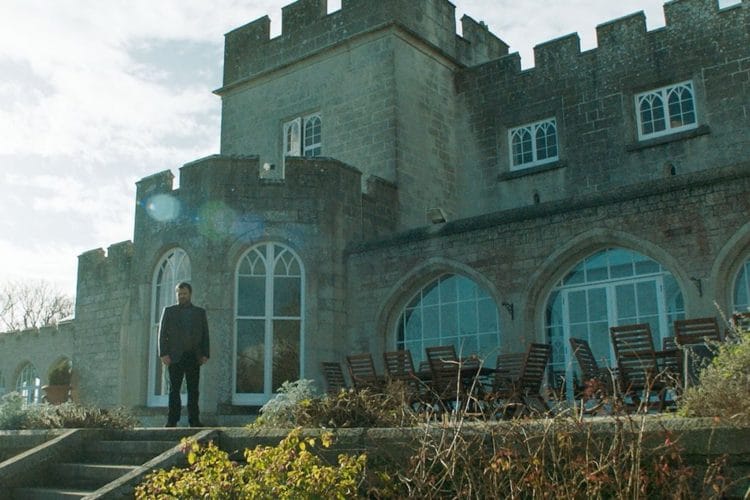If audiences go to a Ben Wheatley movie expecting anything, it’s violence. Grisly thrills are a given in the cult director’s films – think of High Rise’s opening scene or Free Fire’s whole schtick – but, surprisingly, the only shots fired in his latest film come via the barbed dialogue exchanged between its characters. Still, even though the lack of blood and bullets in holiday drama Happy New Year, Colin Burstead does mark a significant revamp of Wheatley’s style, it’s not a total sea change: there is still much of his directorial DNA here, including meticulously delivered tension and laughs. That should supply die-hard Wheatley fans with some familiar ground, but the biggest potential Wheatley’s transformed style has here lies in extending his fanbase beyond its usual borders.
As its title suggests, Happy New Year is a sardonically-tinged drama; one that builds to a climax without the help of any midnight fireworks. In a small coastal castle rented for the occasion, an eclectic group of family and friends are herded together (somewhat against their will) to bring in the new year by the titular Colin (Neil Maskell). That choice of location is widely interpreted by his relatives as a classic Colin move; a showboating reminder of his financial success and his self-appointed status as de facto leader of the family. Naturally, Colin’s self-crowning is something else his brother (Sam Riley) and sister (Hayley Squires) take issue with and, amongst all of the Bursteads’ petty quarrels, this dispute is one the film itself isn’t afraid to wade into. Contrary to the single character focus its title suggests, Happy New Year isn’t really Colin’s film – it belongs to its ensemble of vivid characters, all of whom command matching levels of attention.
Both because of the ingenuity of the casting (by Shaheen Baig) and the script — which Wheatley wrote in consultation with his cast — Happy New Year feels like a triumph of democratic storytelling. There are some very familiar faces here, including Charles Dance, Bill Paterson and a smirking Riley, but even though international audiences may be less familiar with the work of Doon Mackichan, Sinead Matthews, Asim Chaudhry and Maskell than with their Game of Thrones-associated co-star, these under-celebrated actors are given their due chance to shine. For her part, Mackichan gives a particularly incisive (and hilarious) turn as the Bursteads’ emotionally demanding matriarch, while Maskell is both her dry comic foil and a brilliant evocation of an aneurysm waiting to happen. They both steal the film’s first truly ensemble scene, but there’s fierce competition in Chaudhry and Matthews’ shared scenes, so equally matched are Sham (Chaudhry) and Lainey (Matthews) in their clownish absurdity.

As we’ve come to expect from the fraught family reunion set-up, there are long-bubbling tensions lying just beneath the Bursteads’ thin facades, and it doesn’t take long for them to shatter the barely-held-together illusion of happy domesticity. That complicated history is invoked in the film’s very first scene, in which Gini (Squires) reveals she has secretly invited estranged brother David (Riley) to the party as a “surprise” for their recovering mother Sandy (Mackichan). Gini’s revelation turns the mood sour whenever it’s shared between Burstead and Burstead, but audiences are left guessing the reason behind his black sheep status until Riley’s character eventually arrives at the venue, much later than everyone else, collar popped and with his German girlfriend in tow. It turns out that, on top of going AWOL after leaving his wife and children for Hannah (Alexandra Maria Lara, Riley’s real life wife) several years prior, David is also guilty of causing his father serious financial trouble.
David’s appearance and the shouty confrontations it provokes kick-starts a debate about the obligations of being loyal to a family: both to those you make and those you’re born into. His betrayals are specific and difficult to forgive, but Happy New Year is at its most perceptive when it recognizes the role of that fundamental family sin – selfishness – in the Bursteads’ conflict. As with every member of the Bursteads (even Gini, despite her protestations to the contrary), that’s a transgression most of the movie’s viewers are likely to be guilty of. The way the Bursteads first myopically deny their self-absorption and then tentatively grapple with its consequences is, as in life, a messy process, but it gives Happy New Year a sympathetic edge that encourages a warm audience connection to the film.
Given that Happy New Year will be broadcast on UK television during the Christmas period, that sense of warts-and-all relatability is likely to be the effect Wheatley intended. It’s a feeling amplified by the film’s ending and a particularly lovely credits sequence (as the names of cast and crew flash up, Wheatley and his team join the actors on the castle’s dancefloor). But devoid of this specific broadcast context – because Christmas absolutely requires a happy ending – the narrative feels slight, and the film suffers.
That’s not to say that its individual elements aren’t up to par: Clint Mansell’s Celtic-themed score adds atmosphere, while Laurie Rose’s handheld camerawork and Wheatley’s brisk editing give Happy New Year a vital kinetic energy. High-calibre performances and the screenplay’s sardonic wit also help to reinvigorate the slightly tired sub-genre of holiday dramas about dysfunctional families. But for all its cutting insight, sharp humor and technical flourish, Happy New Year doesn’t quite feel cinematic enough. This is a movie for Christmas, not for life.
The post ‘Happy New Year, Colin Burstead’ Review: A Violence-Free Ben Wheatley Movie is Born (LFF) appeared first on Film School Rejects.
0 comments:
Post a Comment